When it comes to selecting the perfect canine companion for a hunting expedition, the question of “What is the best hunting dog breed?” sparks passionate debate among enthusiasts. The answer, as with many things in life, is subjective and depends on individual preferences, hunting styles, and the specific game being pursued. However, there are breeds that consistently stand out for their versatility, intelligence, and unwavering dedication in the field. At Dog Care Story, we’ve delved deep into what makes a hunting dog truly exceptional, focusing on breeds that embody the spirit of partnership and performance.
For generations, humans and dogs have shared an intimate, mutually beneficial relationship, a partnership that has been crucial for survival and success in hunting. This ancient bond has even influenced our evolution, with some theories suggesting that the specialized skills of early hunting dogs freed up cognitive resources for human intellectual development. Dogs possess an uncanny ability to read our body language and respond to subtle cues, a testament to this deep connection. Ultimately, we hunt with dogs because they share our passion, perhaps even more intensely than we do. Their skill, artistry, tenacity, and courage inspire us, but it’s their sheer enthusiasm that truly drives the partnership forward. This guide celebrates the very best of these remarkable canine athletes.
Top Hunting Dog Breeds for Versatility and Performance
The world of hunting dogs is vast and diverse, with each breed bringing unique strengths to the field. While many breeds excel in specific niches, some are recognized for their all-around capabilities, making them ideal for a variety of hunting scenarios. Here, we explore breeds that consistently prove their worth as the best all-around hunting dog breed candidates.
1. Labrador Retriever
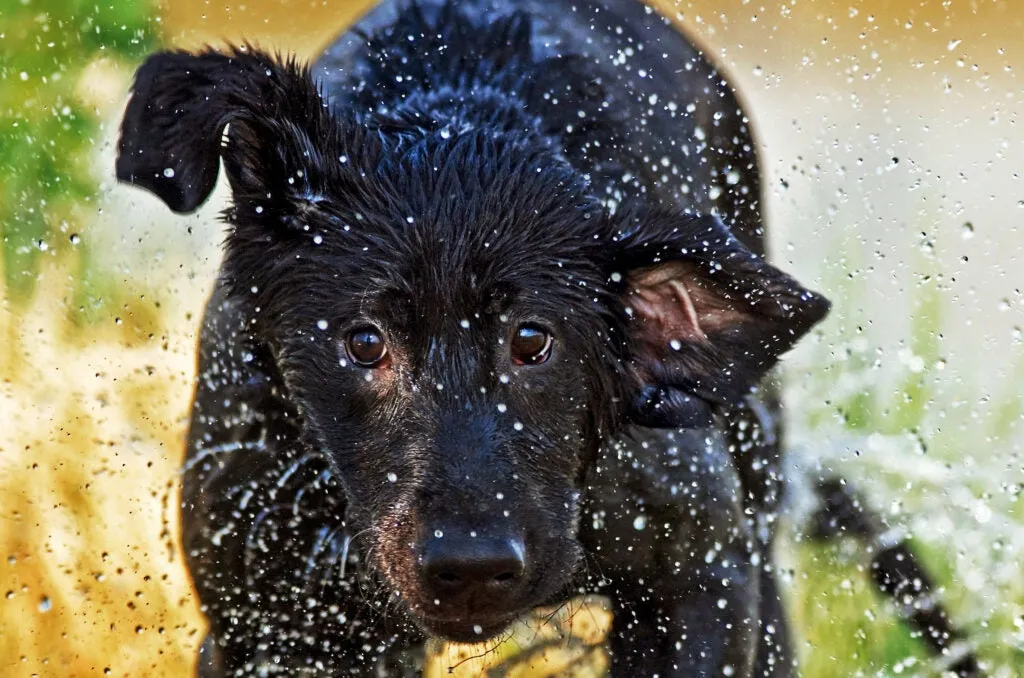 Labrador retriever runs through water on a hunt.
Labrador retriever runs through water on a hunt.
The Labrador Retriever is undeniably a top contender for the title of the best all-around hunting dog breed. While often depicted as cuddly companions in popular media, the working Labrador is a different beast entirely. For hunters, the true “cuteness” lies in a Lab with a bird in its mouth, coated in duckweed, or mud-caked paws – a testament to their tireless work ethic. Their unwavering dedication, especially in retrieving downed game from challenging waters or dense cover, is what truly captures a hunter’s heart. Originating from Newfoundland, these dogs were bred for their retrieving prowess, possessing a water-shedding coat and a powerful build. While primarily known for waterfowl retrieval, their versatility extends to pointing pheasants, flushing quail, and even trailing rabbits. A Lab’s ability to remain focused and eager, even when cold and wet, showcases their profound love for the hunt and their role as a true partner in the field.
2. Brittany
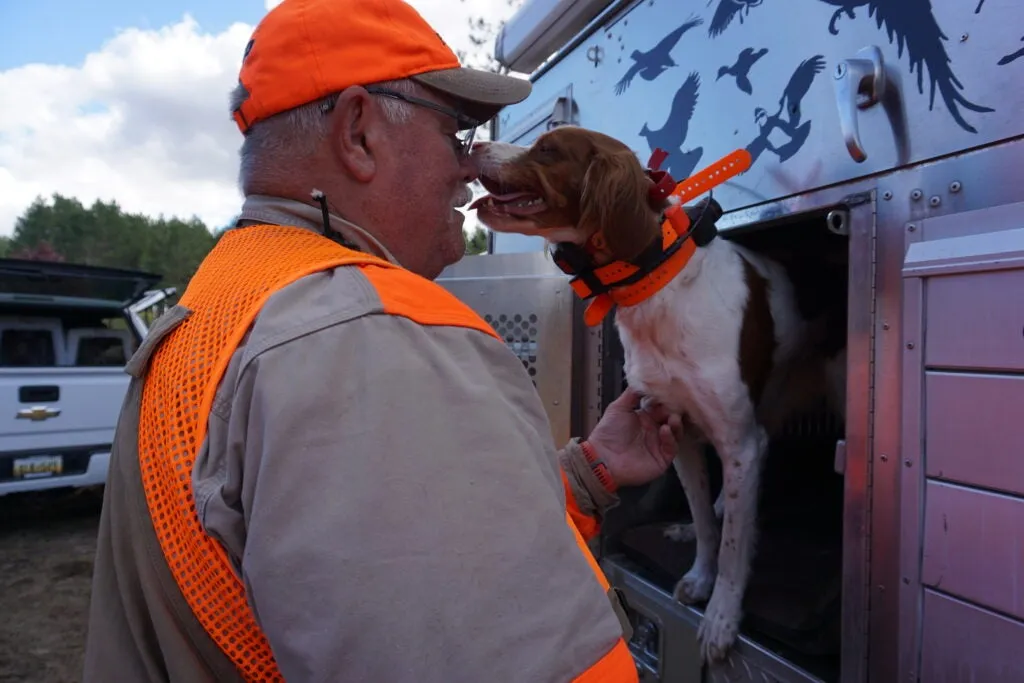 Brittany gets read to go on a grouse hunt.
Brittany gets read to go on a grouse hunt.
The Brittany, a breed that rekindles a passion for hunting, exemplifies the spirit of a versatile companion. Their remarkable intelligence and eagerness to please make them a joy to train and hunt with. While not necessarily the largest breed, a well-trained Brittany possesses all the capabilities of their larger counterparts. Their compact size makes them easily transportable, fitting seamlessly into a hunter’s lifestyle, whether spending the week at home or embarking on a weekend hunting trip. The satisfaction of watching a Brittany expertly point game, flush it upon command, and then retrieve it flawlessly is a rewarding experience for any hunter. This breed’s unique blend of trainability and hunting instinct solidifies its position among the top hunting breeds. For those seeking a capable and adaptable canine partner, the Brittany is an excellent choice.
3. English Setter
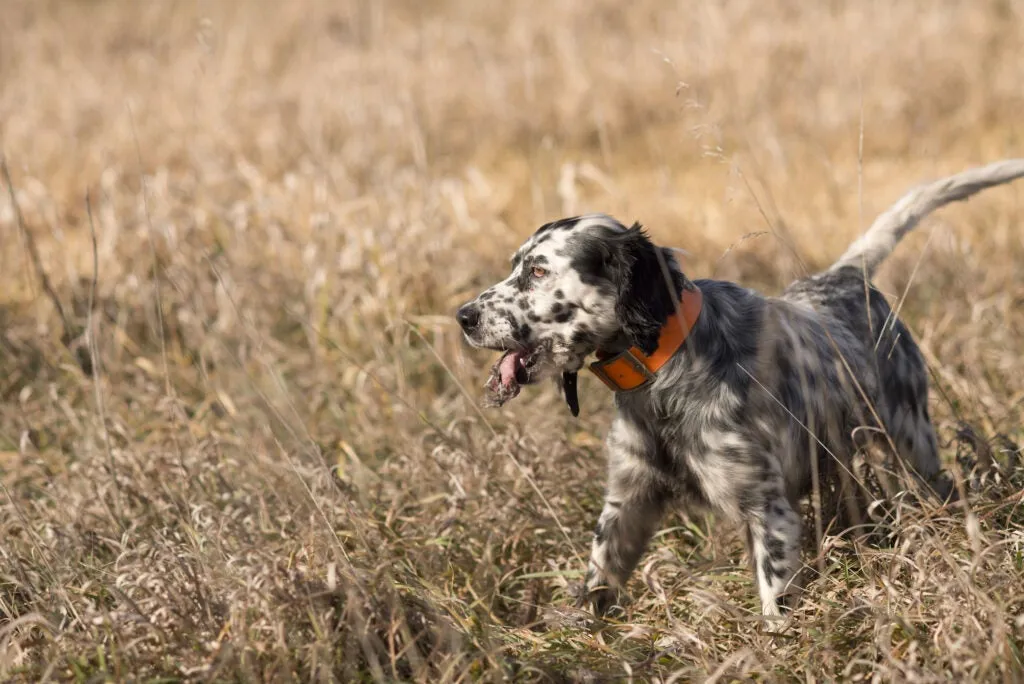 Brittany searches for birds on an upland bird hunt.
Brittany searches for birds on an upland bird hunt.
The English Setter, with its elegant appearance and storied history, evokes a sense of romanticism associated with bygone hunting eras. While generalizations about any breed can be problematic, English Setters are known for their captivating presence in the field. This breed’s journey as a hunting dog has inspired countless artists and writers, a testament to their appeal. While they exhibit a range of temperaments and hunting styles, a well-trained English Setter is a testament to a hunter’s dedication and skill. Their ability to cover ground with grace and style, coupled with a keen instinct for pointing birds, makes them a truly impressive hunting companion. The experience of hunting with an exceptional English Setter is often described as unforgettable, leaving a lasting impression on those fortunate enough to witness their performance.
4. American Foxhound
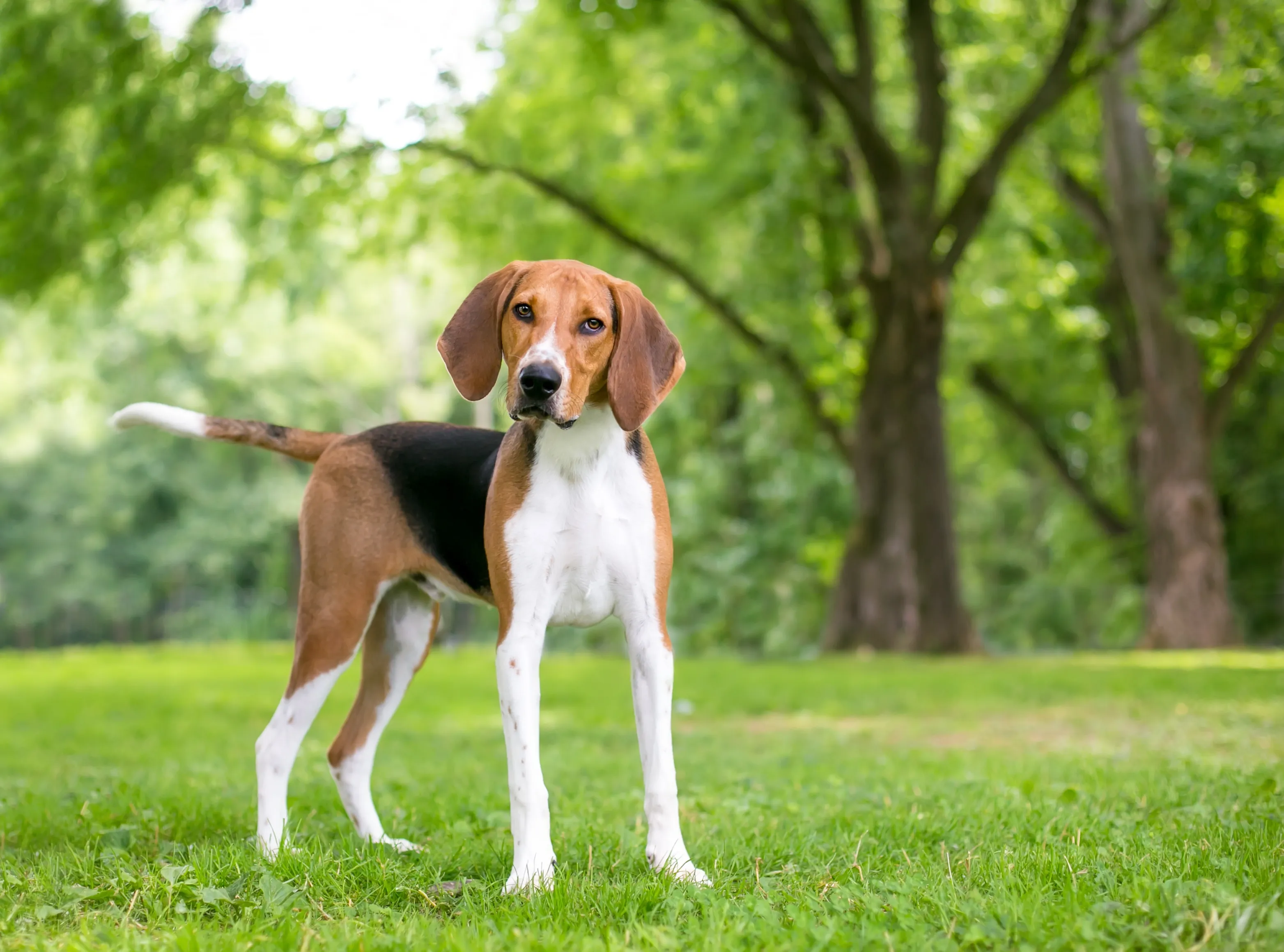 An American fox hound stands on a lawn with woods in the background.
An American fox hound stands on a lawn with woods in the background.
The American Foxhound, a breed steeped in tradition and bred for relentless pursuit, embodies the spirit of classic fox hunting. These long-legged hounds, known for their sweet temperament and exceptional scent-tracking abilities, are built for endurance. Their distinctive howl, often described as bell-like, is a hallmark of their presence in the field. American Foxhounds are relentless in their pursuit of quarry, capable of running for hours until the scent is lost. Their courage is remarkable; even with injuries, they often refuse to quit, demonstrating a tenacity known as “bottom” in hunting circles. While their primary role has historically been in fox hunting, their powerful noses and unwavering determination make them a formidable presence in any scent-driven hunting pursuit. For those who appreciate the thrill of a driven hunt, the American Foxhound offers an unparalleled experience.
5. Treeing Walker Coonhound
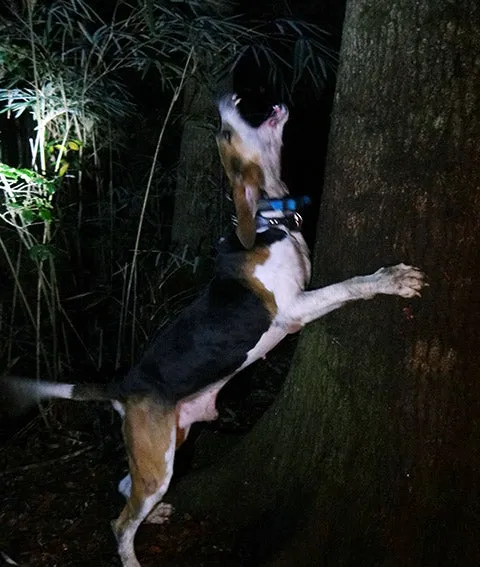 A treeing-walker-hound barks at a treed raccoon at night.
A treeing-walker-hound barks at a treed raccoon at night.
The Treeing Walker Coonhound stands out for its grit and competitive spirit among hound breeds. Having been around these dogs for decades, their quick starts and drive are consistently impressive. They possess a natural inclination to pursue various game, from deer to foxes, demonstrating a robust work ethic. Training pups on live raccoons provides a more natural and effective approach, resulting in a settled and focused dog at the tree. The excitement of a night hunt with Treeing Walkers is unparalleled, with their distinctive locating bark signaling success. Their ability to track and tree game efficiently makes them highly valued by hunters. The phrase “Come on, Daddy, I got this thing!” perfectly captures the confident and capable nature of these exceptional hounds.
6. Beagle
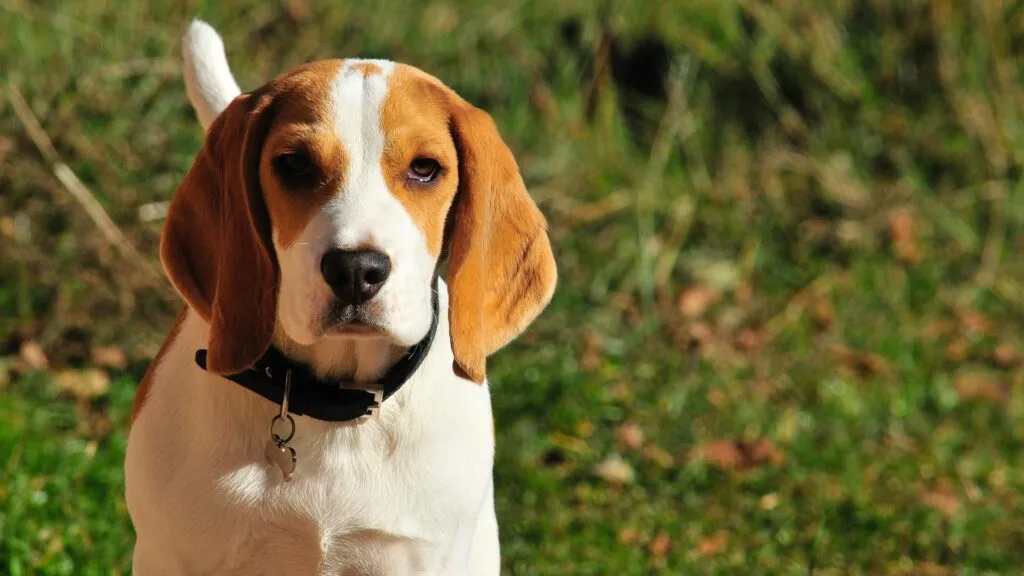 beagles are great dogs for hunting small game.
beagles are great dogs for hunting small game.
The Beagle, a breed deeply ingrained with the instinct to hunt small game, is a quintessential rabbit hunter. Even a single Beagle or a pair can be incredibly effective, demonstrating a DNA-driven passion for the chase. With a history dating back to the 15th century, Beagles have evolved into sophisticated hunters known for their keen sense of smell and legendary trail toughness. Beyond their hunting prowess, Beagles are renowned for their cheerful disposition, making them happy companions both in the field and at home. Their enthusiasm for venturing into the woods, hell-bent after a hare, is a sight to behold. The Beagle’s ability to bring joy and excitement to the hunting experience, coupled with their unwavering dedication to the task, makes them a beloved and effective hunting breed.
7. German Wirehaired Pointer
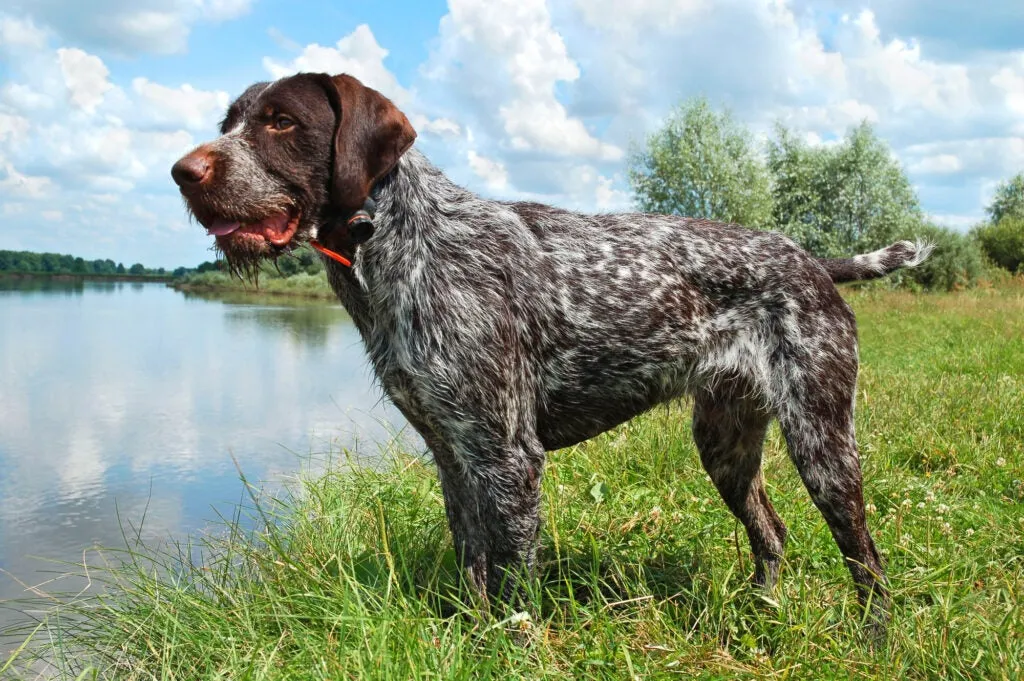 German Wirehaired Pointer, one of the best hunting dog breeds, pauses on a bird hunt
German Wirehaired Pointer, one of the best hunting dog breeds, pauses on a bird hunt
The German Wirehaired Pointer (GWP) is a formidable all-around gun dog, particularly valued for its tenacity in challenging terrain. Their bristly coat offers excellent insulation and protection, making them well-suited for all-weather conditions. GWPs excel at tracking cripples through dense cover, retrieving waterfowl, and even dispatching vermin. The breed exists in two forms: the Deutsch Drahthaar, bred for extreme versatility and tested rigorously, and the Americanized German Wirehaired Pointer. While Drahthaars can be intense and may not be ideal around small children due to their strong prey drive, both types are proficient hunters. GWPs hunt with their heads up, relying on air scent, and are excellent retrievers. Their toughness and protective nature also make them reliable companions in the field and at home.
8. Mountain Cur
The Mountain Cur, a breed historically essential to pioneers in the Southern Appalachians and Ohio River Valley, embodies rugged utility and unwavering loyalty. These compact, often bobtailed hounds possess a remarkable ability to herd livestock, bay bears, and tree squirrels, making them indispensable companions for early settlers. While some may overlook them as mixed breeds, those in the know recognize their distinct heritage and capabilities. The revival of cur breeding has brought forth various recognized lines, with the original Mountain Cur remaining close to its ancestral roots. These dogs are characterized by their athleticism, keen senses, and a strong prey drive that makes them formidable hunters of small game and larger predators. Their historical significance and continued relevance in modern hunting underscore their value as a truly versatile breed.
9. Boykin Spaniel
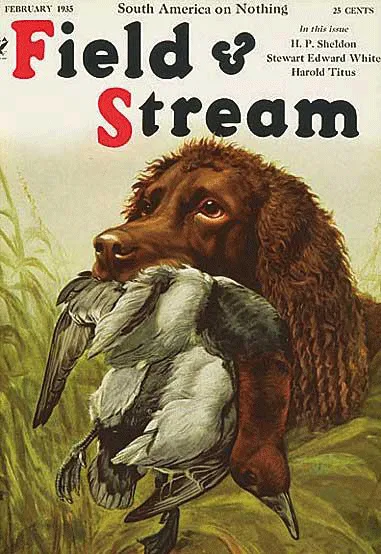 Boykin spaniel on vintage Field & Stream cover
Boykin spaniel on vintage Field & Stream cover
The Boykin Spaniel, South Carolina’s state dog, is a testament to the power of a smaller, yet highly capable, hunting companion. Initially developed for turkey hunters in the swamps, this breed quickly demonstrated its talent for flushing and retrieving a variety of game. Their compact size makes them ideal for hunting from small boats and navigating dense cover. While they may not be suited for extremely cold, open-water duck hunts due to their size and lack of a dense undercoat, Boykins excel in dove fields, quail covers, and retrieving waterfowl in milder conditions. Their strong prey drive, intelligence, and admirable home behavior make them a well-rounded choice. A well-trained Boykin, like Pritchard mentioned in the original text, exemplifies the breed’s ability to perform admirably in the field and be a cherished family member.
10. Golden Retriever
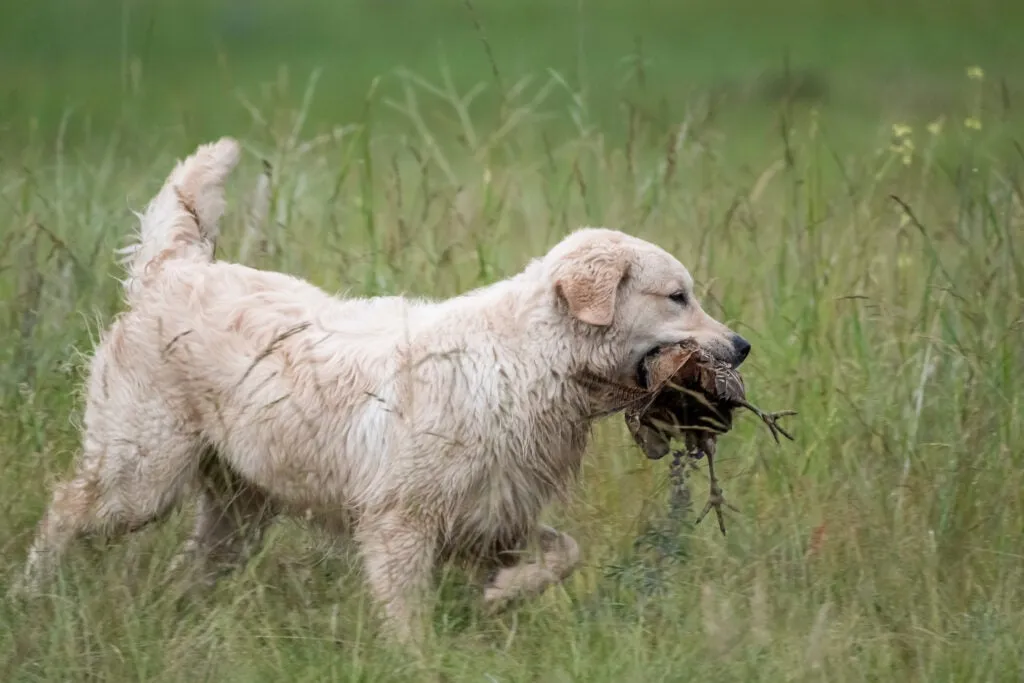 Golden retriever, one of the best hunting dog breeds, retrieves a bird on a hunt.
Golden retriever, one of the best hunting dog breeds, retrieves a bird on a hunt.
Despite their glamorous image, Golden Retrievers possess the heart of a rugged, all-purpose hunter. Beneath their affectionate and eager-to-please exterior lies a breed with remarkable toughness and tenacity. Their ability to perform exceptionally in both marsh and upland environments often surprises those who only see their photogenic side. Goldens are known for their unwavering dedication; the story of Sidney, the Golden Retriever who retrieved a grouse long after the hunters had given up, exemplifies this breed’s determination. They are birdy, intelligent, biddable, and possess an excellent nose, making them superb for flushing pheasants in heavy cover. While they may bring a bit more water into the blind than some hardcore waterfowlers prefer, their keen marking and powerful swimming abilities make them a strong choice for duck hunting as well.
11. Irish Setter
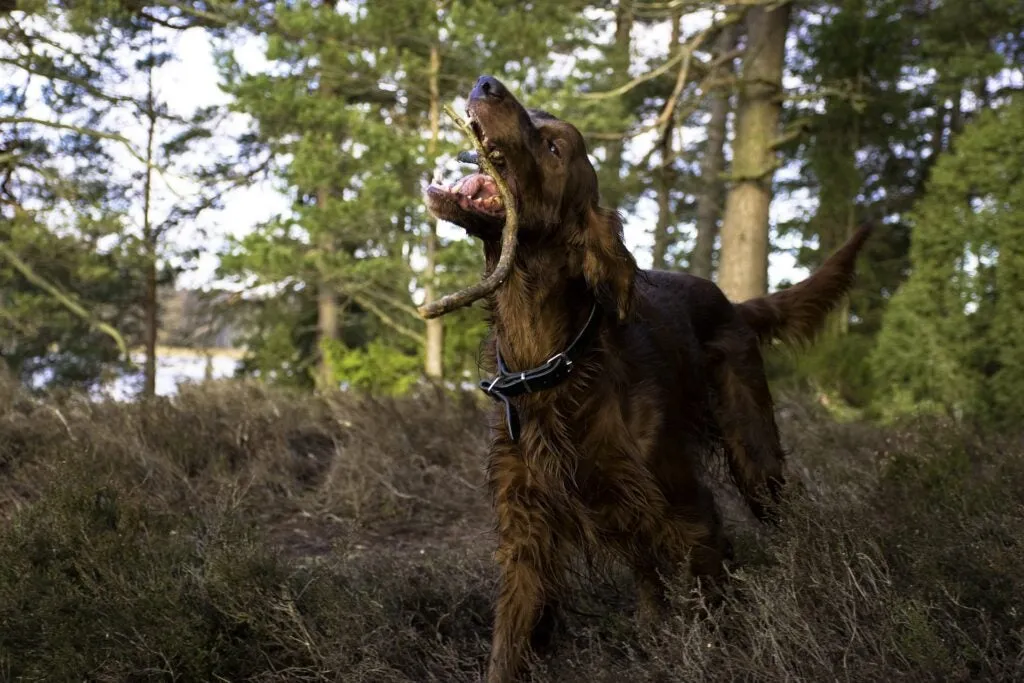 Irish setter, one of the best hunting dog breeds, fetches a stick
Irish setter, one of the best hunting dog breeds, fetches a stick
The Irish Setter, with its striking mahogany coat, is often considered one of the most beautiful hunting dogs. While historically, breeders focused heavily on conformation, leading to a disconnect between show and field lines, today’s hunting Irish Setters are a testament to renewed dedication to their working heritage. These athletic, stylish, and deceptively tough dogs are excellent bird-finders and versatile hunters. Advocates of the breed claim they are every bit the equal of the English Setter in the field, and evidence of bulging game bags and satisfied hunters supports this assertion. It’s worth noting the distinction between “red setters” and “Irish setters,” which primarily relates to registration with different kennel clubs, but both are capable hunting dogs. Their resurgence in popularity is well-deserved, offering hunters a blend of beauty and formidable field performance.
12. Bluetick Hound
The Bluetick Hound is a quintessential scent hound, known for its exceptional nose and unwavering dedication to the trail. Their distinctive mottled coat and blocky heads are indicative of their heritage, tracing back to French bleu de Gascogne hounds and the venerable English Foxhound. Blueticks are renowned for their ability to tree game, whether it be bears or raccoons, and their vocalizations while on the trail are a thrilling part of the hunting experience. While their “free-tonguing” nature means they vocalize frequently, their chill personality belies their high energy levels, requiring ample exercise. For those seeking a dog with a perfect blend of olfactory prowess and heart, the Bluetick Hound is an enduring choice.
13. English Pointer
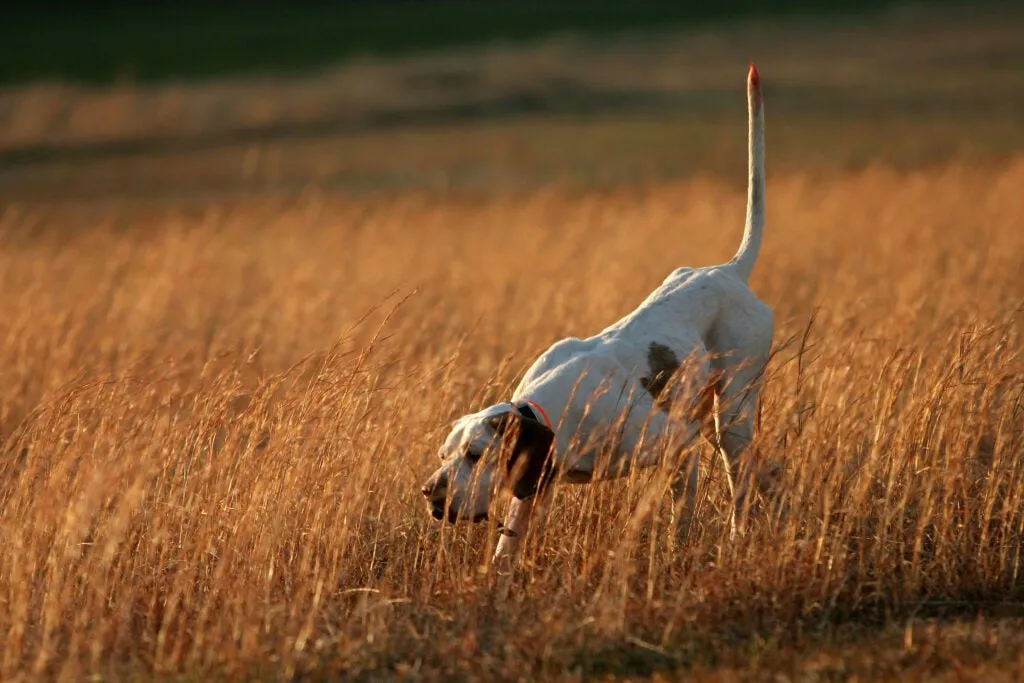 Pointer, English springer spaniel, one of the best hunting dog breeds, finds a bird on an upland hunt.
Pointer, English springer spaniel, one of the best hunting dog breeds, finds a bird on an upland hunt.
The English Pointer, officially known simply as the Pointer, represents peak performance in the bird-hunting world. Described as a “Ferrari” of hunting dogs, their intensity and speed are unmatched, capable of covering vast territories with incredible efficiency. When a Pointer strikes a point, it transforms from pure kinetic energy into a quivering statue of canine focus. However, this exceptional performance requires a skilled handler; an inexperienced trainer might find a Pointer “too much dog.” Their primary limitation is their susceptibility to cold, making them less ideal for harsh, late-season hunts in frigid temperatures. Despite this, a Pointer’s ability to perform in ideal conditions is extraordinary. Furthermore, contrary to the perception of aloofness, Pointers can be affectionate house dogs and thrive when treated as partners in the hunting endeavor.
14. English Springer Spaniel
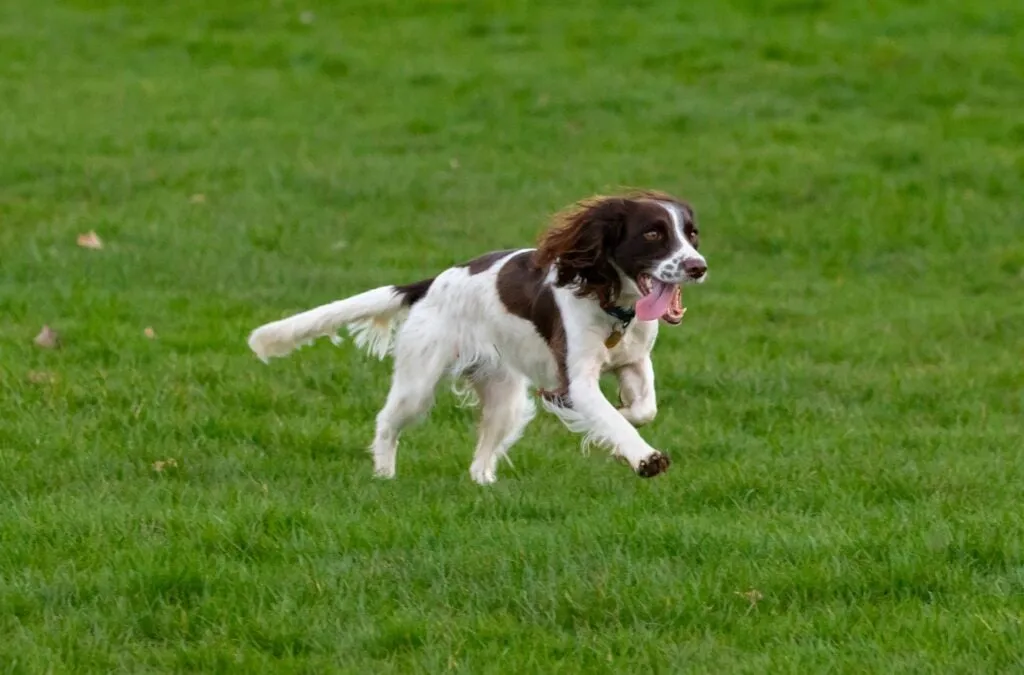 English springer spaniel, one of the best hunting dog breeds, trains in a field.
English springer spaniel, one of the best hunting dog breeds, trains in a field.
The English Springer Spaniel is a dynamic and energetic flushing dog, known for its explosive speed and unwavering determination in cover. Their pursuit of game is relentless, often described as a non-stop machine, leaping through brambles and brush with impressive agility. While their dramatic airborne flushes might not add extra points, they certainly add to the thrill of the hunt. Springer Spaniels also possess excellent retrieving abilities, rivaling those of Labrador Retrievers, and have a superior nose for recovering downed birds. Beyond their field prowess, their moderate size and lack of a strong odor make them wonderful house dogs, bringing joy and companionship to their families year-round. Their happy disposition and affectionate nature make them a pleasure to have around, both in and out of the field.
15. Chesapeake Bay Retriever
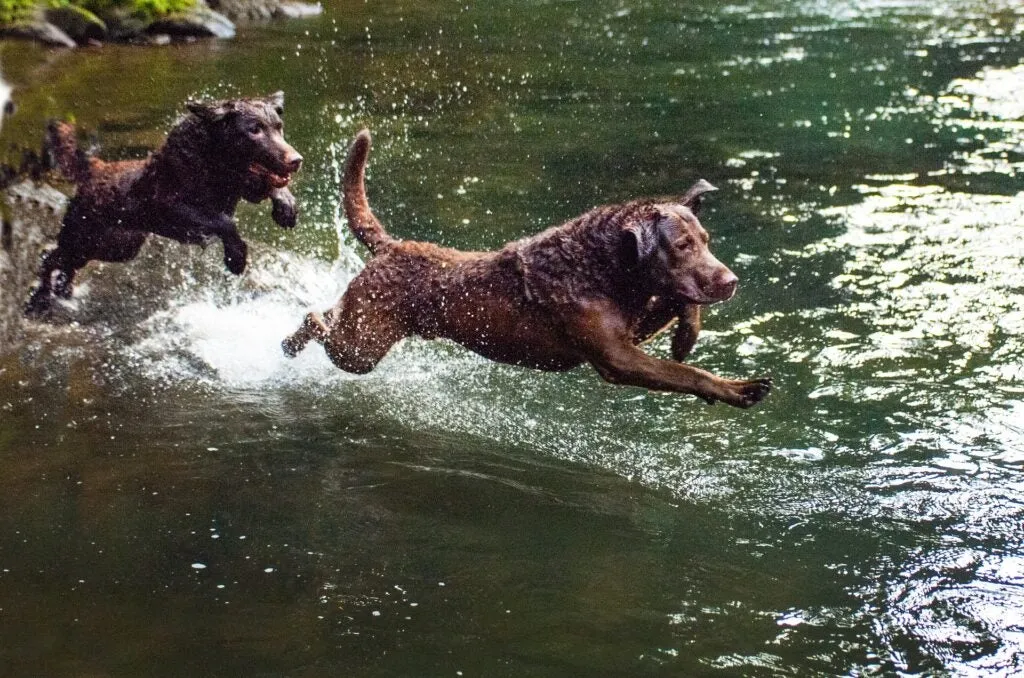 Chesapeake bay retrievers, one of the best hunting dog breeds, jumping in the water
Chesapeake bay retrievers, one of the best hunting dog breeds, jumping in the water
The Chesapeake Bay Retriever (Chessie) distinguishes itself through its exceptional intelligence and unparalleled devotion to its owner. While other retrievers may be friendly with everyone, a Chessie forms an intense bond, acting as a true sidekick and partner. This deep loyalty makes them excellent watchdogs. In the field, Chessies are athletic, love the outdoors, and possess remarkable determination, especially in challenging cold-water conditions. They have excellent noses and are adept at finding crippled birds, making them premier waterfowl dogs for those who hunt in tough environments. However, their strong will and quick learning ability necessitate consistent and innovative obedience training. A Chessie thrives when integrated into the owner’s life, becoming a constant companion in various activities, thus unlocking their full potential as a devoted and loyal hunting partner.
16. American Pit Bull Terrier
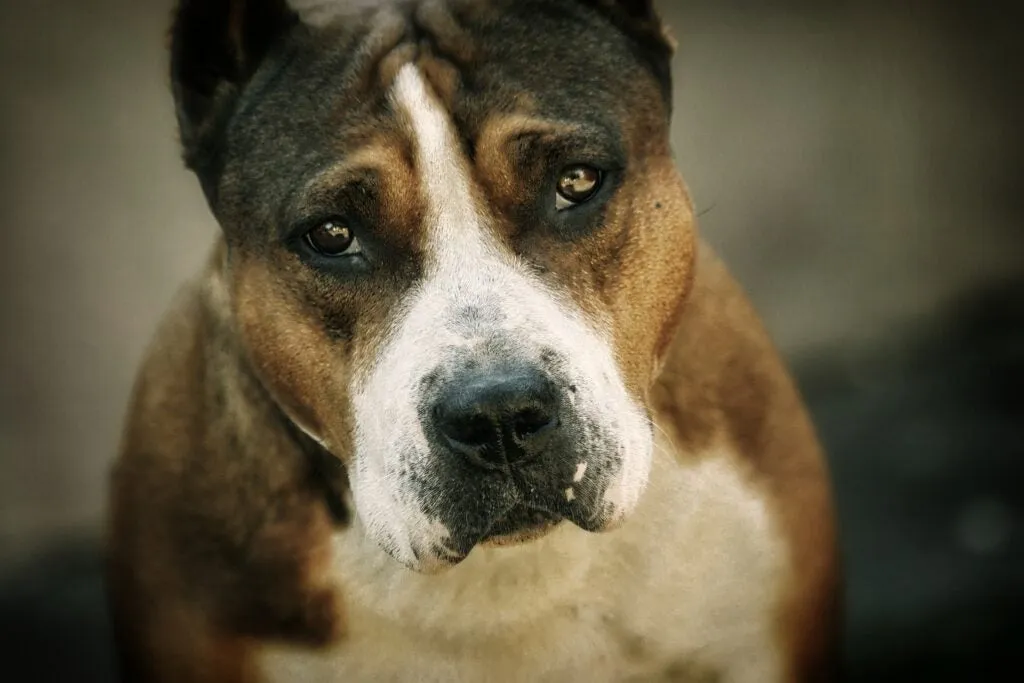 American pitbull, one of the best hunting dog breeds, shows her sweet side
American pitbull, one of the best hunting dog breeds, shows her sweet side
The American Pit Bull Terrier, often misunderstood, proves its mettle as a formidable hunting dog, particularly in hog hunting. These dogs are fearless and possess the strength and tenacity to bring down large game. Their ability to handle tough conditions, as demonstrated by their role in manhandling wild pigs in challenging terrains, is remarkable. Despite their fierce reputation in the hunt, Pit Bulls are also known for their loving and gentle nature as family companions. The surge in wild pig populations has revitalized the Pit Bull’s role in the sporting world, where they are unmatched in their ability to confront and subdue feral hogs in difficult environments. This breed offers a unique combination of ferocity in the field and affectionate loyalty at home.
17. Cocker Spaniel
The field-bred Cocker Spaniel is a “pocket rocket” of canine energy, a true dynamo in the field. Known for their incredible drive and speed, these dogs are masters at flushing game, especially grouse and woodcock, as their name implies. Their enthusiastic pursuit through dense cover is a sight to behold, and their ability to locate and retrieve birds is exceptional. While their association with hunting dates back to the 1850s, Cocker Spaniels have experienced a renaissance in recent decades, proving themselves to be not only functional game-getters but also one of the most exciting breeds to hunt over. Their natural hunting abilities mean they require less intensive training, and with a solid obedience foundation, they quickly adapt to the demands of the hunt. Their mischievous streak adds to their charm, making them a delightful, albeit sometimes humorous, hunting partner.
18. German Shorthaired Pointer
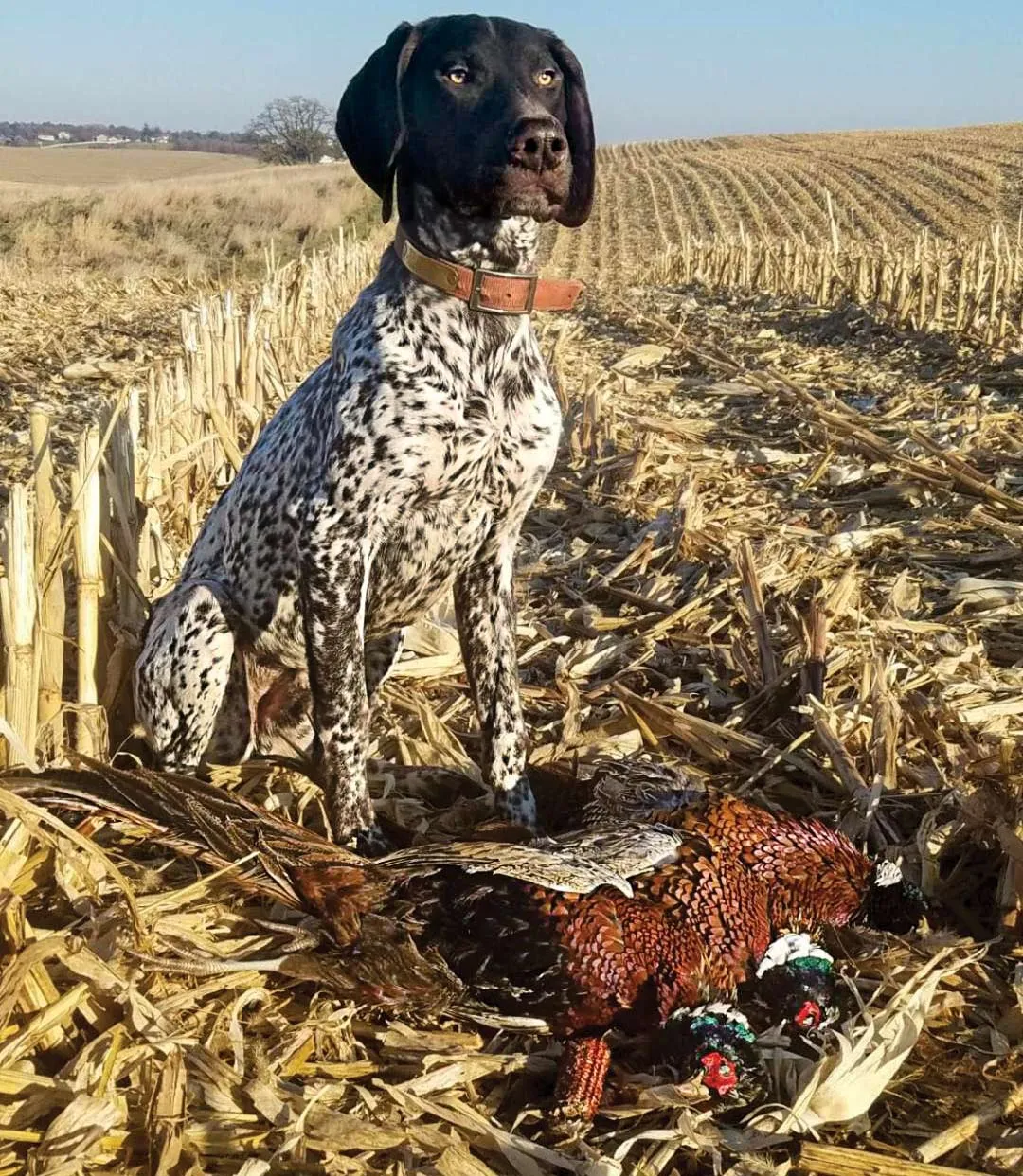 Hunting Dogs photo
Hunting Dogs photo
The German Shorthaired Pointer (GSP) is widely recognized as America’s quintessential bird dog. Their presence is felt wherever there are birds to be found, from Iowa pheasants to Idaho chukars. GSPs are versatile hunters, capable of pointing upland birds, retrieving waterfowl, and even tracking raccoons at night. Their biddable nature, ease of training, and excellent retrieving skills make them a natural fit for hunters on foot. The GSP’s coat is designed to shed burrs effectively while providing warmth during late-season hunts. While their dignified expression might be mistaken for aloofness, GSPs raised in the home develop into lifelong, devoted companions. Their adaptability and inherent hunting talent make them a top choice for a variety of hunting pursuits.
19. Redbone Coonhound
The bark of a Redbone Coonhound at night, signaling a treed quarry, is a sound that never gets old. These hounds are born and bred to run and tree, and their tracking ability is consistently impressive. Unlike some other hound breeds where finding a truly effective tracker can take time and effort with multiple litters, Redbones are known for their innate talent. They are easy to train and quickly pick up hunting and tracking skills. The pursuit and the observation of these dogs at work are often more rewarding than the kill itself, as breeders continually strive to improve upon each generation. Redbones also make wonderful companion dogs, eager to please both in the trees and at home, whether on the back porch or indoors. Their adaptability as companions does not diminish their hunting prowess.
20. Jack Russell Terrier
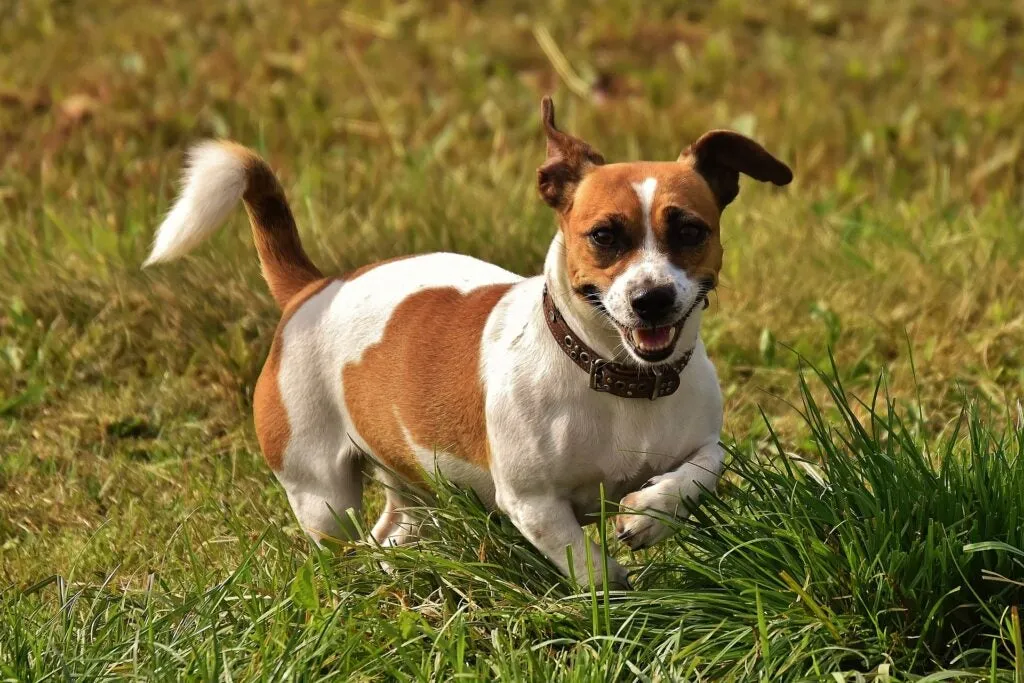 Jack russell terrier, one of the best hunting dog breeds, runs in a field
Jack russell terrier, one of the best hunting dog breeds, runs in a field
The Jack Russell Terrier (JRT) is a small dog with a large-dog personality, renowned for its tenacity and versatility in hunting. Primarily bred for pest control, their courage and agility make them effective in tackling badgers, foxes, and raccoons. Big-game hunters also utilize JRTs for blood-trailing deer and elk, with their small size making them easy to manage on the lead. Their bravery is legendary, with some PHs from South Africa even using them for trailing lions due to their ability to confront dangerous game and evade retaliation. While they can be excellent at flushing birds, their enthusiasm may sometimes lead them to flush game out of range. The satisfaction of unlocking a JRT’s genetic code and witnessing them perform their bred-for tasks is immense, showcasing their unwavering tenacity and sweet nature.
21. Plott Hound
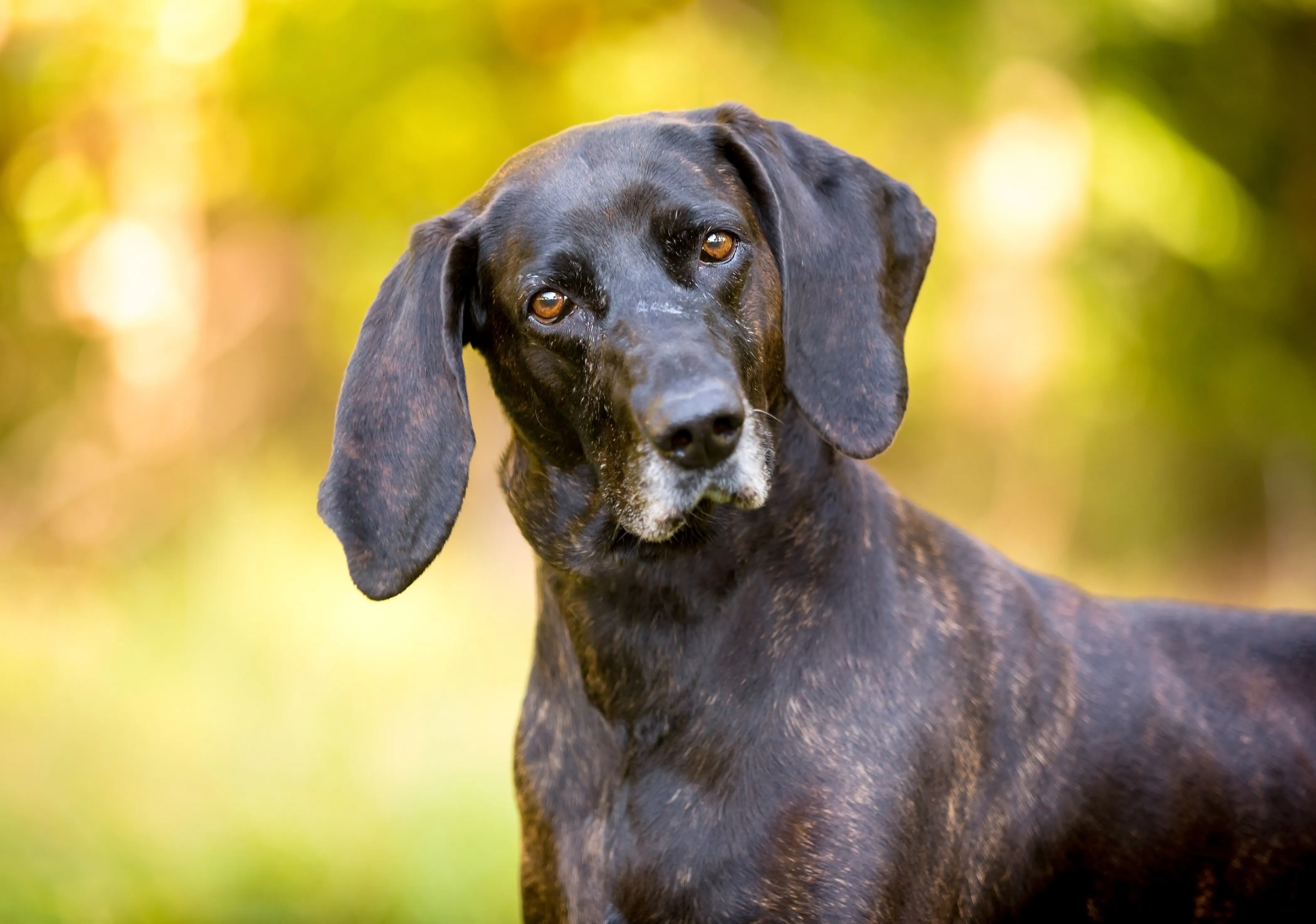 A Plott hound looks at the camera with sunny woods in the background.
A Plott hound looks at the camera with sunny woods in the background.
The Plott Hound stands as one of America’s premier hunting dog breeds, celebrated for its exceptional ability to navigate complex scent trails over challenging terrain. Originating from German bloodhounds brought to the Smoky Mountains in the 1750s, the Plott family meticulously bred these dogs for generations. Plotts are renowned for their prowess in hunting bears and boars, and later, for their skill in running raccoons. These athletic, medium-framed hounds possess a distinctive brindled coat and are adept at sorting through intricate scent patterns. The Plott Hound’s unwavering focus and determination, exemplified by Danger’s ability to locate other dogs on a bear hunt, highlight their critical role in a successful hunting expedition. Their ability to lead younger dogs to the quarry and hold it until the hunter arrives is a testament to their intelligence and instinct.
Bonus Breeds: The Unusual Suspects
Beyond the widely recognized hunting breeds, there are several less common but equally impressive dogs that excel in the field. These “unusual suspects” offer unique advantages and deserve recognition for their hunting capabilities.
Small Munsterlander
The Small Munsterlander is a versatile continental dog developed around 1900 for hunters whose livelihoods depended on selling game. They are known for their ability to track and retrieve, essential skills for market hunting. While they are supposed to retrieve birds with silence, they will bay on the track of furred game. Anka, a Small Munsterlander, is noted for her exceptional pheasant retrieving skills and her adorable yipping as she tracks. These dogs, ranging from 30 to 38 pounds with a liver-and-white coat, resemble a setter-springer cross but offer a broader range of abilities. They are biddable, easy to train, compact, and make excellent family pets, yet their presence in hunting circles is surprisingly limited, considering their impressive capabilities.
Hunting Doodles (Labradoodles and Goldendoodles)
While Labradoodles and Goldendoodles may not immediately evoke the image of a traditional hunting dog, many possess the drive and ability to perform exceptionally in the field. The original intention behind these crosses was not hunting, but rather to create hypoallergenic guide dogs. However, breeders specializing in hunting strains have developed lines that excel in flushing and fetching. Their popularity as designer dogs has led to a global presence, and their hunting capabilities are increasingly recognized. When seeking a hunting doodle, it is crucial to find a breeder who specifically focuses on producing dogs with field potential, understanding the various “F” classifications to identify the ideal mix. Some of these versatile doodles even exhibit pointing abilities.
Dachshund
The Dachshund, whose name translates to “badger hound,” is a breed that deserves more recognition for its hunting heritage. Their short legs and long bodies are perfectly adapted for crawling into holes and confronting badgers, a task they have performed since the 1500s. Dachshunds possess a fierce temperament and a high prey drive, making them determined hunters of various furred game, and some will even retrieve birds. They also make excellent deer-tracking dogs, and their small size (7-30 pounds) makes handling them on a blood trail manageable. Dachshunds come in different coat types and sizes, but all share a tenacious spirit. While they can be stubborn and may not tolerate the boisterousness of very young children, careful selection of a breeder can help find a Dachshund that fits your hunting and family needs.
Finding Your Best All-Around Hunting Dog Breed
The search for the best all-around hunting dog breed is a personal journey. Whether you’re drawn to the enduring loyalty of a Labrador Retriever, the spirited performance of a Brittany, or the tenacity of a Dachshund, each breed offers a unique partnership in the pursuit of game. Ultimately, the best hunting dog is one that shares your passion, possesses the skills for your chosen hunting style, and becomes a cherished member of your family. By understanding the strengths and characteristics of these diverse breeds, you can make an informed decision to find your perfect canine companion for a lifetime of adventures in the great outdoors.
